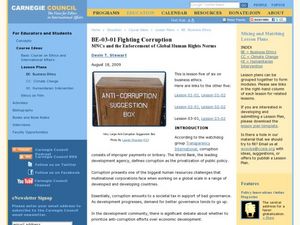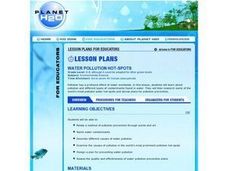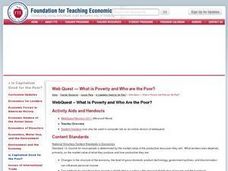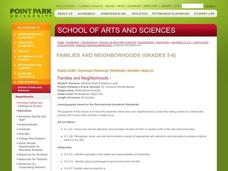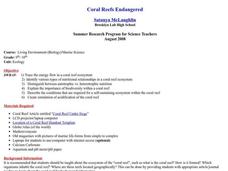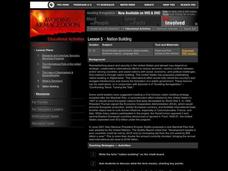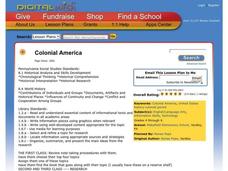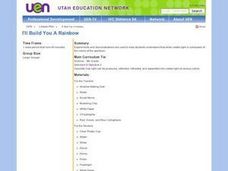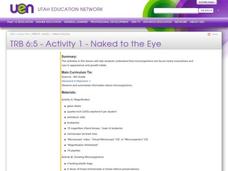Curated OER
Water World Story
Fourth graders write a story about how a drop of water may have traveled to school. They design a presentation on the water cycle.
Curated OER
Fighting Corruption
Twelfth graders research the different types of business ethics. In this Economics lesson, 12th graders read various handouts on corruption. Students participate in a discussion on trying to end corruption.
Curated OER
Water Pollution Hot-Spots
Students complete internet research in small groups to identify types of water pollution, spotlight water pollution hot-spots, and design a plan for water prevention.
Curated OER
Pecan Lessons
Students complete lessons on the computer related to pecans. Students complete assignments such as typing descriptions of pecan categories, using email to find out information, researching the internet about production regions, and more.
Curated OER
WebQuest- What is Poverty and Who Are the Poor?
Students are introduced to a variety of easily accessible data about poverty. The search activity performs double-duty in exposing students to the nature and magnitude of world poverty and in confronting them with different types and...
Curated OER
Families and Neighborhoods
Students build their own neighborhood. In this instructional activity on community, students are introduced to books about families and neighborhoods. As a class, the students create their own neighborhood, elect a leader for their...
Curated OER
Coral Reefs Endangered
Learners identify different types of nutritional relationships in a coral reef system and trace the energy flow. In this marine biology lesson students create a simulation of acidification of the coral reef.
Curated OER
Nation Building
High schoolers explore the concept of nation building. In this diplomacy lesson plan, students research America's nation building efforts in Somalia, Haiti, the Balkans, Guatemala, Cuba, Vietnam, and Grenada. High schoolers share their...
Curated OER
Colonial America
Students discover the history of Colonial America by creating a class presentation. In this U.S. History lesson, students utilize the Internet to research one of 20 topics in which they will create a PowerPoint or other type of...
Curated OER
Egyptian Civilization
Fifth graders explore facets of ancient Egyptian life. In this lesson on ancient civilizations, 5th graders find the location of ancient Egyptian nations on a world map and describe the climate and features. They explain how post...
Curated OER
I'll Build You A Rainbow
Sixth graders conduct a variety of experiments to explore types of light and the concept of refraction. They observe objects in water, use water and prisms to create rainbows and combine light filtered through colored cellophane to...
Curated OER
Naked to the Eye
Sixth graders conduct a variety of experiments that enable them to investigate bacteria. They use microscopes, prepared slides, video, moldy bread and pond water to observe types of bacteria and how bacteria interacts with the...
Curated OER
Environment" The Mining Cycle
Students explore the world of mining and explain its importance in daily life. After describing how companies search for mineral deposits, they examine the environmental consequences of mining as well as the positive aspects. The...
Curated OER
Heat Misconceptions
Third graders determine that gloves do not provide heat, but rather, they insulate or hold in any heat that is in their hand. They discuss the different temperatures found in ecosystems around the world. What do animals that live in...
Curated OER
How do we write a report?
Students write a report on a word processing program. In this report lesson, students write about what qualities a hero possesses. They type it on a word processing program and proofread for spelling, grammar, punctuation and more.
Curated OER
Anne Frank: The Island of the Skog
Learners read and discuss The Island of the Skog by Steven Kellogg and examine the illustrations, keep a "discrimination log," and write about one example of discrimination and how they could have intervened to stop it.
Curated OER
Why Nations Trade
Students explore the concept of international trade. In this economics instructional activity, students read the 2 provided handouts about international trade and then discuss their content.
Curated OER
Culture of the Ancient Greeks
For this World History worksheet, students complete an activity by filling in various categories that refer to the ancient Greeks. They identify their government, religion, and education. Finally, student identify various transportation...
Curated OER
Historical Maryland Women
Students identify objects, activities, and people in pictures of women in Maryland's history. In groups of four, they analyze photo packets of historical women. Students complete an acrostic using phrases reflecting specific...
Curated OER
FDR's Fireside Chat on the Purposes and Foundations of the Recovery Program
Students discuss how they get information on important events or activities that occur in the national government today. They evaluate the New Deal, utilizing document analysis worksheets imbedded in this plan.
Curated OER
Historical Atlas
Sixth graders evaluate how revolutions have affected the world throughout history (i.e. boundaries of nations, culture, economics, etc...) through the research for and creation of a historical atlas for assigned countries.
Curated OER
Water Use and Conservation
Young scholars discuss the different types of water found on Earth. They discover why not all water is used for drinking and calculate how much water they use. They create their own water conservation plan.
Curated OER
Tropical Regions/Mapping Biodiversity
Pupils use a world map to locate the country of Puerto Rico. In groups, they identify the various types of vegetation found on the island. They compare and contrast the biodiversity of the country to the United States. To end the...
Curated OER
GEOGRAPHY OF FOOD & FIBER
Students will explain the ways geography determines the crops grown in the United States and other countries, and the resulting trade relationships.1. Discuss trade routes, both ancient and current. Discuss why the most direct route from...



